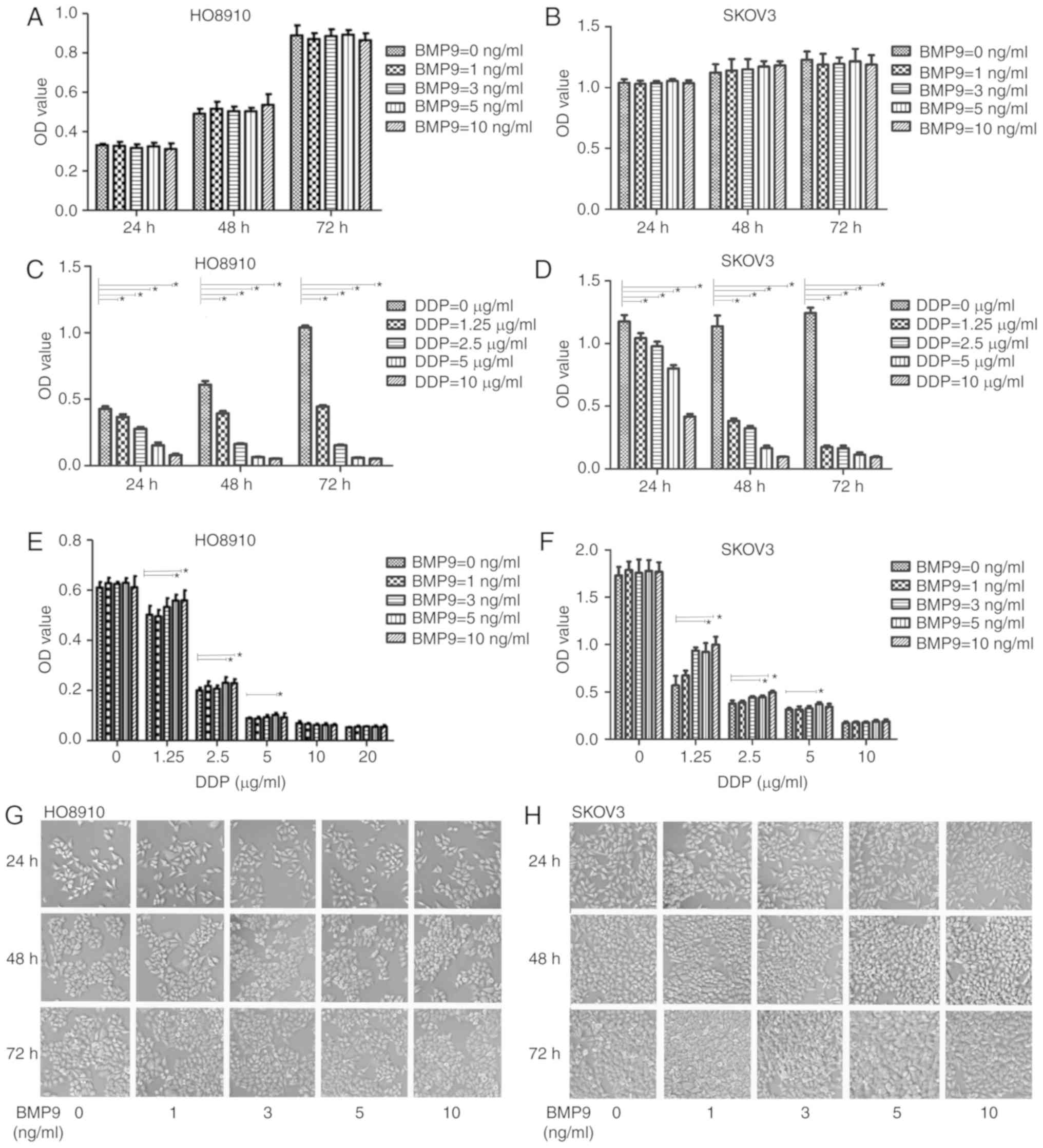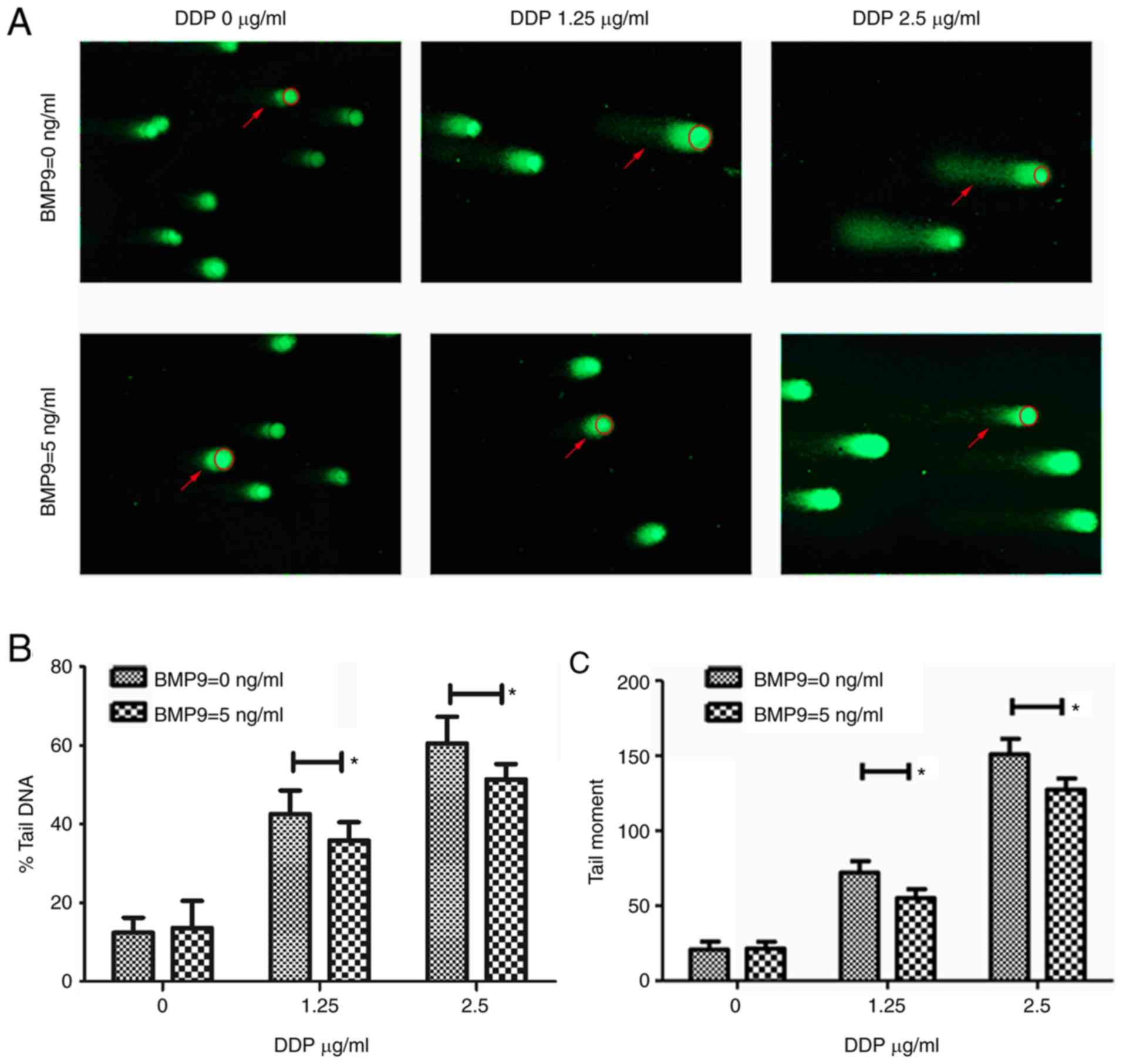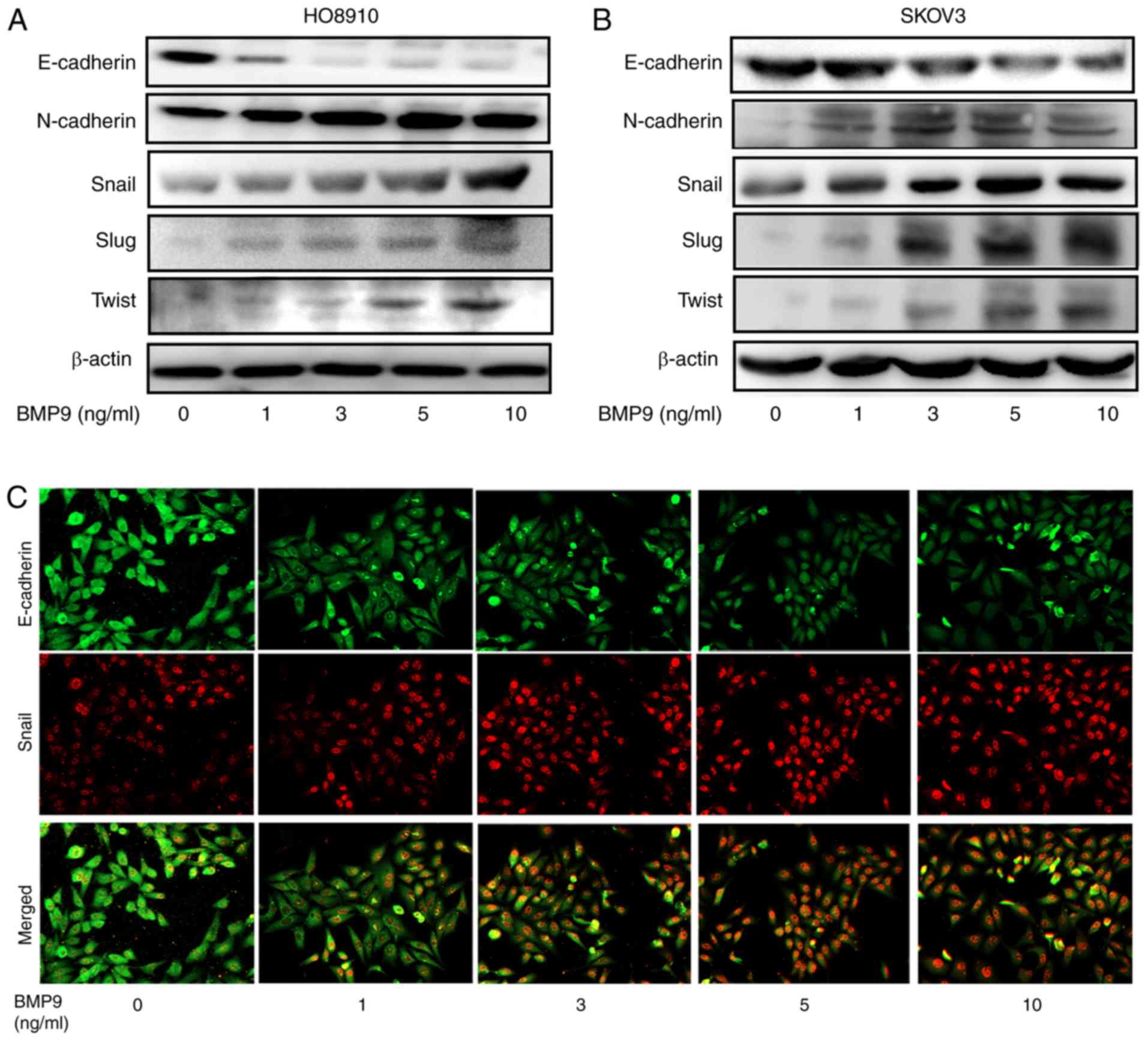|
1
|
Chen W, Zheng R, Baade PD, Zhang S, Zeng
H, Bray F, Jemal A, Yu XQ and He J: Cancer statistics in China,
2015. CA Cancer J Clin. 66:115–132. 2016. View Article : Google Scholar : PubMed/NCBI
|
|
2
|
Global Burden of Disease Cancer
Collaboration, ; Fitzmaurice C, Allen C, Barber RM, Barregard L,
Bhutta ZA, Brenner H, Dicker DJ, Chimed-Orchir O, Dandona R, et al:
Global, regional, and national cancer incidence, mortality, years
of life lost, years lived with disability, and disability-adjusted
life-years for 32 cancer groups, 1990 to 2015: A systematic
analysis for the global burden of disease study. JAMA Oncol.
3:524–548. 2017. View Article : Google Scholar : PubMed/NCBI
|
|
3
|
Zhao H, Wei W, Sun Y, Gao J, Wang Q and
Zheng J: Interference with the expression of β-catenin reverses
cisplatin resistance in A2780/DDP cells and inhibits the
progression of ovarian cancer in mouse model. DNA Cell Biol.
34:55–62. 2015. View Article : Google Scholar : PubMed/NCBI
|
|
4
|
Morgan SL, Medina JE, Taylor MM and
Dinulescu DM: Targeting platinum resistant disease in ovarian
cancer. Curr Med Chem. 21:3009–3020. 2014. View Article : Google Scholar : PubMed/NCBI
|
|
5
|
Ye H, Karim AA and Loh XJ: Current
treatment options and drug delivery systems as potential
therapeutic agents for ovarian cancer: A review. Mater Sci Eng C
Mater Biol Appl. 45:609–619. 2014. View Article : Google Scholar : PubMed/NCBI
|
|
6
|
McKeage MJ: New-generation platinum drugs
in the treatment of cisplatin-resistant cancers. Expert Opin
Investig Drugs. 14:1033–1046. 2005. View Article : Google Scholar : PubMed/NCBI
|
|
7
|
Yu X, Chen Y, Tian R, Li J, Li H, Lv T and
Yao Q: miRNA-21 enhances chemoresistance to cisplatin in epithelial
ovarian cancer by negatively regulating PTEN. Oncol Lett.
14:1807–1810. 2017. View Article : Google Scholar : PubMed/NCBI
|
|
8
|
Quail DF and Joyce JA: Microenvironmental
regulation of tumor progression and metastasis. Nat Med.
19:1423–1437. 2013. View
Article : Google Scholar : PubMed/NCBI
|
|
9
|
Pickup M, Novitskiy S and Moses HL: The
roles of TGFβ in the tumour microenvironment. Nat Rev Cancer.
13:788–799. 2013. View
Article : Google Scholar : PubMed/NCBI
|
|
10
|
Wakefield LM and Hill CS: Beyond TGFβ:
Roles of other TGFbeta superfamily members in cancer. Nat Rev
Cancer. 13:328–341. 2013. View
Article : Google Scholar : PubMed/NCBI
|
|
11
|
Marchini S, Fruscio R, Clivio L, Beltrame
L, Porcu L, Fuso Nerini I, Cavalieri D, Chiorino G, Cattoretti G,
Mangioni C, et al: Resistance to platinum-based chemotherapy is
associated with epithelial to mesenchymal transition in epithelial
ovarian cancer. Eur J Cancer. 49:520–530. 2013. View Article : Google Scholar : PubMed/NCBI
|
|
12
|
Liang S, Marti TM, Dorn P, Froment L, Hall
S, Berezowska S, Kocher G, Schmid RA and Peng R: 18P -
Epithelial-to-mesenchymal transition (EMT) is required for
resistance to anti-folate chemotherapy in lung cancer. J Thor Onc.
11:S632016. View Article : Google Scholar
|
|
13
|
Funaki S, Shintani Y, Kawamura T, Kanzaki
R, Minami M and Okumura M: Chemotherapy enhances programmed cell
death 1/ligand 1 expression via TGF-β induced epithelial
mesenchymal transition in non-small cell lung cancer. Oncol Rep.
38:2277–2284. 2017. View Article : Google Scholar : PubMed/NCBI
|
|
14
|
Ma W, Ma J, Xu J, Qiao C, Branscum A,
Cardenas A, Baron AT, Schwartz P, Maihle NJ and Huang Y: Lin28
regulates BMP4 and functions with Oct4 to affect ovarian tumor
microenvironment. Cell Cycle. 12:88–97. 2013. View Article : Google Scholar : PubMed/NCBI
|
|
15
|
Ehata S, Yokoyama Y, Takahashi K and
Miyazono K: Bi-directional roles of bone morphogenetic proteins in
cancer: Another molecular Jekyll and Hyde? Pathol Int. 63:287–296.
2013. View Article : Google Scholar : PubMed/NCBI
|
|
16
|
Wang K, Feng H, Ren W, Sun X, Luo J, Tang
M, Zhou L, Weng Y, He TC and Zhang Y: BMP9 inhibits the
proliferation and invasiveness of breast cancer cells MDA-MB-231. J
Cancer Res Clin Oncol. 137:1687–1696. 2011. View Article : Google Scholar : PubMed/NCBI
|
|
17
|
Wang J, Weng Y, Zhang M, Li Y, Fan M, Guo
Y, Sun Y, Li W and Shi Q: BMP9 inhibits the growth and migration of
lung adenocarcinoma A549 cells in a bone marrow stromal cellderived
microenvironment through the MAPK/ERK and NF-κB pathways. Oncol
Rep. 36:410–418. 2016. View Article : Google Scholar : PubMed/NCBI
|
|
18
|
Thawani JP, Wang AC, Than KD, Lin CY, La
Marca F and Park P: Bone morphogenetic proteins and cancer: Review
of the literature. Neurosurgery. 66:233–246; discussion 246. 2010.
View Article : Google Scholar : PubMed/NCBI
|
|
19
|
Shepherd TG and Nachtigal MW:
Identification of a putative autocrine bone morphogenetic
protein-signaling pathway in human ovarian surface epithelium and
ovarian cancer cells. Endocrinology. 144:3306–3314. 2003.
View Article : Google Scholar : PubMed/NCBI
|
|
20
|
Peng J, Yoshioka Y, Mandai M, Matsumura N,
Baba T, Yamaguchi K, Hamanishi J, Kharma B, Murakami R, Abiko K, et
al: The BMP signaling pathway leads to enhanced proliferation in
serous ovarian cancer-A potential therapeutic target. Mol Carcinog.
55:335–345. 2016. View
Article : Google Scholar : PubMed/NCBI
|
|
21
|
Peart TM, Correa RJ, Valdes YR, Dimattia
GE and Shepherd TG: BMP signalling controls the malignant potential
of ascites-derived human epithelial ovarian cancer spheroids via
AKT kinase activation. Clin Exp Metastasis. 29:293–313. 2012.
View Article : Google Scholar : PubMed/NCBI
|
|
22
|
Chen C, Grzegorzewski KJ, Barash S, Zhao
Q, Schneider H, Wang Q, Singh M, Pukac L, Bell AC, Duan R, et al:
An integrated functional genomics screening program reveals a role
for BMP-9 in glucose homeostasis. Nat Biotechnol. 21:294–301. 2003.
View Article : Google Scholar : PubMed/NCBI
|
|
23
|
David L, Mallet C, Keramidas M, Lamandé N,
Gasc JM, Dupuis-Girod S, Plauchu H, Feige JJ and Bailly S: Bone
morphogenetic protein-9 is a circulating vascular quiescence
factor. Circ Res. 102:914–922. 2008. View Article : Google Scholar : PubMed/NCBI
|
|
24
|
Herrera B, Dooley S and Breitkopf-Heinlein
K: Potential roles of bone morphogenetic protein (BMP)-9 in human
liver diseases. Int J Mol Sci. 15:5199–5220. 2014. View Article : Google Scholar : PubMed/NCBI
|
|
25
|
Ren W, Sun X, Wang K, Feng H, Liu Y, Fei
C, Wan S, Wang W, Luo J, Shi Q, et al: BMP9 inhibits the bone
metastasis of breast cancer cells by downregulating CCN2
(connective tissue growth factor, CTGF) expression. Mol Biol Rep.
41:1373–1383. 2014. View Article : Google Scholar : PubMed/NCBI
|
|
26
|
Li Q, Gu X, Weng H, Ghafoory S, Liu Y,
Feng T, Dzieran J, Li L, Ilkavets I, Kruithof-de Julio M, et al:
Bone morphogenetic protein-9 induces epithelial to mesenchymal
transition in hepatocellular carcinoma cells. Cancer Sci.
104:398–408. 2013. View Article : Google Scholar : PubMed/NCBI
|
|
27
|
Jung JW, Yoon SM, Kim S, Jeon YH, Yoon BH,
Yang SG, Kim MK, Choe S and Kuo MM: Bone morphogenetic protein-9 is
a potent growth inhibitor of hepatocellular carcinoma and reduces
the liver cancer stem cells population. Oncotarget. 7:73754–73768.
2016. View Article : Google Scholar : PubMed/NCBI
|
|
28
|
Sherma S and Lippard S: Structural aspects
of platinum anticancer durg interaction with DNA. Chem Rev.
87:1153–1157. 1987. View Article : Google Scholar
|
|
29
|
Zhou K, Shi X, Huo J, Liu W, Yang D, Yang
T, Qin T and Wang C: Bone morphogenetic protein 4 is overexpressed
in and promotes migration and invasion of drug-resistant cancer
cells. Int J Biol Macromol. 101:427–437. 2017. View Article : Google Scholar : PubMed/NCBI
|
|
30
|
Gao Y, Shan N, Zhao C, Wang Y, Xu F, Li J,
Yu X, Gao L and Yi Z: LY2109761 enhances cisplatin antitumor
activity in ovarian cancer cells. Int J Clin Exp Pathol.
8:4923–4932. 2015.PubMed/NCBI
|
|
31
|
Hover LD, Young CD, Bhola NE, Wilson AJ,
Khabele D, Hong CC, Moses HL and Owens P: Small molecule inhibitor
of the bone morphogenetic protein pathway DMH1 reduces ovarian
cancer cell growth. Cancer Lett. 368:79–87. 2015. View Article : Google Scholar : PubMed/NCBI
|
|
32
|
Lian WJ, Liu G, Liu YJ, Zhao ZW, Yi T and
Zhou HY: Downregulation of BMP6 enhances cell proliferation and
chemoresistance via activation of the ERK signaling pathway in
breast cancer. Oncol Rep. 30:193–200. 2013. View Article : Google Scholar : PubMed/NCBI
|
|
33
|
Herrera B, van Dinther M, Ten Dijke P and
Inman GJ: Autocrine bone morphogenetic protein-9 signals through
activin receptor-like kinase-2/Smad1/Smad4 to promote ovarian
cancer cell proliferation. Cancer Res. 69:9254–9262. 2009.
View Article : Google Scholar : PubMed/NCBI
|
|
34
|
Brand V, Lehamann C, Umkehrer C, Thier M,
de Wouters M, Raemsch R, Jucknischke U, Haas A and Breuer S: Impact
of selective anti-BMP9 treatment on tumor cells and tumor
angiogenesis. Mol Oncol. 10:1603–1620. 2016. View Article : Google Scholar : PubMed/NCBI
|
|
35
|
Kalluri R and Weinberg RA: The basics of
epithelial-mesenchymal transition. J Clin Invest. 119:1420–1428.
2009. View Article : Google Scholar : PubMed/NCBI
|
|
36
|
Zhang L, Ye Y, Long X, Xiao P, Ren X and
Yu J: BMP signaling and its paradoxical effects in tumorigenesis
and dissemination. Oncotarget. 7:78206–78218. 2016.PubMed/NCBI
|
|
37
|
Marcucci F, Stassi G and De Maria R:
Epithelial-mesenchymal transition: A new target in anticancer drug
discovery. Nat Rev Drug Discov. 15:311–325. 2016. View Article : Google Scholar : PubMed/NCBI
|
|
38
|
Rosso M, Majem B, Devis L, Lapyckyj L,
Besso MJ, Llauradó M, Abascal MF, Matos ML, Lanau L, Castellví J,
et al: E-cadherin: A determinant molecule associated with ovarian
cancer progression, dissemination and aggressiveness. PLoS One.
12:e01844392017. View Article : Google Scholar : PubMed/NCBI
|
|
39
|
Miow QH, Tan TZ, Ye J, Lau JA, Yokomizo T,
Thiery JP and Mori S: Epithelial-mesenchymal status renders
differential responses to cisplatin in ovarian cancer. Oncogene.
34:1899–1907. 2015. View Article : Google Scholar : PubMed/NCBI
|
|
40
|
Chebouti I, Kasimir-Bauer S, Buderath P,
Wimberger P, Hauch S, Kimmig R and Kuhlmann JD: EMT-like
circulating tumor cells in ovarian cancer patients are enriched by
platinum-based chemotherapy. Oncotarget. 8:48820–48831. 2017.
View Article : Google Scholar : PubMed/NCBI
|
|
41
|
Shibue T and Weinberg RA: EMT, CSCs, and
drug resistance: The mechanistic link and clinical implications.
Nat Rev Clin Oncol. 14:611–629. 2017. View Article : Google Scholar : PubMed/NCBI
|
|
42
|
Vega S, Morales AV, Ocaña OH, Valdés F,
Fabregat I and Nieto MA: Snail blocks the cell cycle and confers
resistance to cell death. Genes Dev. 18:1131–1143. 2004. View Article : Google Scholar : PubMed/NCBI
|
|
43
|
Liang SQ, Marti TM, Dorn P, Froment L,
Hall SR, Berezowska S, Kocher G, Schmid RA and Peng RW: Blocking
the epithelial-to-mesenchymal transition pathway abrogates
resistance to anti-folate chemotherapy in lung cancer. Cell Death
Dis. 6:e18242015. View Article : Google Scholar : PubMed/NCBI
|

















